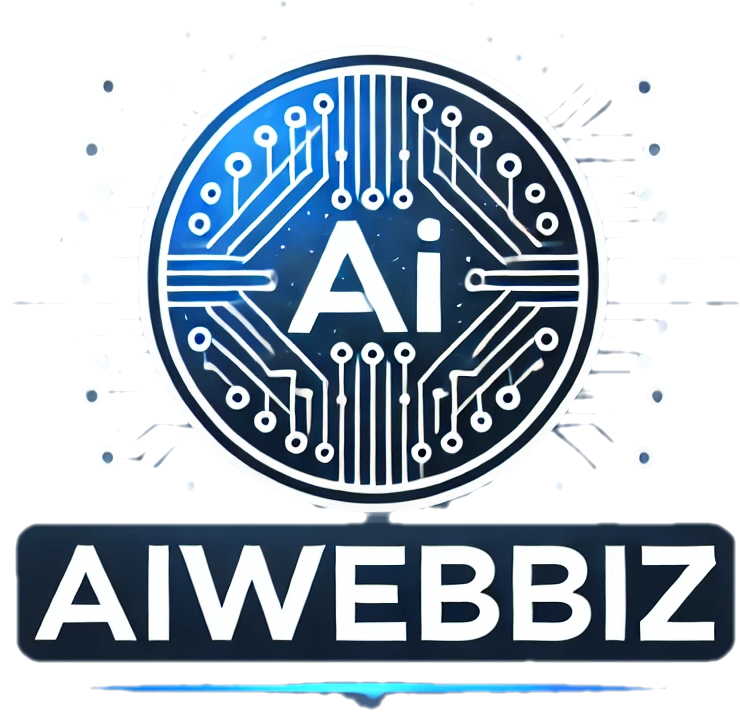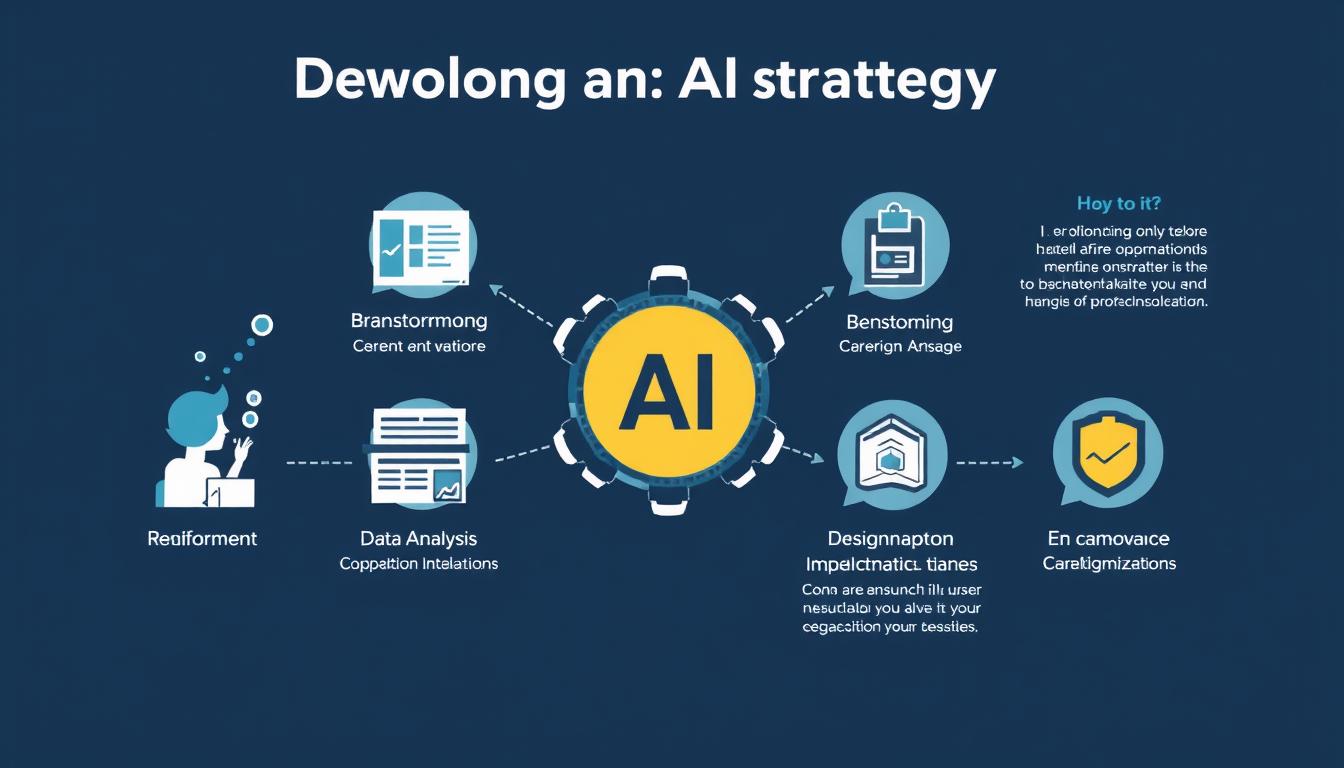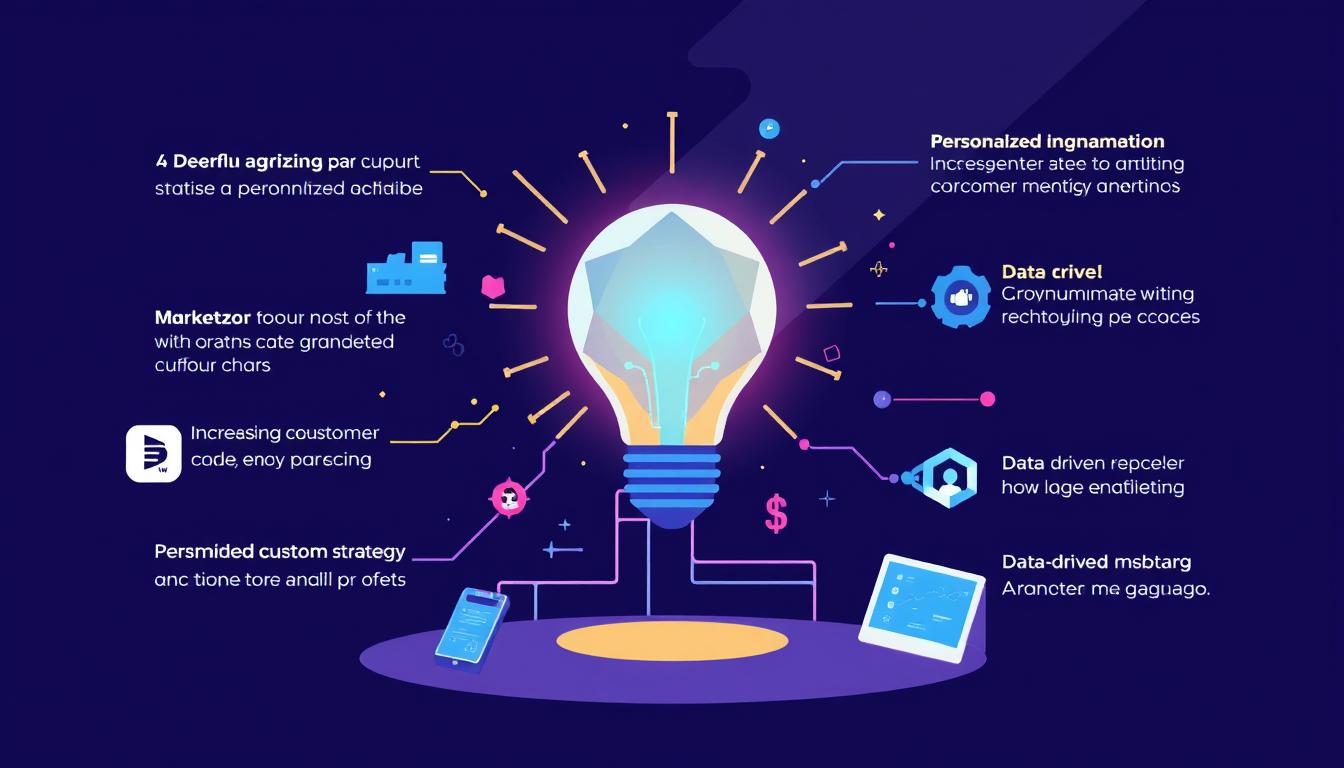The world is on the cusp of a revolution, driven by the rapid advancement and adoption of Artificial Intelligence. According to Statista, the AI market valuation surged to over $184 billion in 2024, a significant jump from $50 billion in 2023. This unprecedented growth presents a unique opportunity for entrepreneurs to capitalize on AI-driven products and services.
As we step into 2025, we’re witnessing a perfect storm of advanced AI capabilities, increasing business adoption, and growing consumer acceptance of AI-powered solutions. Entrepreneurs across industries can now build profitable businesses with relatively low startup costs and high scalability potential. This article will explore five highly profitable AI-powered business ideas poised to thrive in the coming years.
Watch this insightful video on YouTube to gain additional insights into leveraging AI technologies for sustainable and profitable business models.
Key Takeaways
- The AI market is experiencing rapid growth, with a valuation of over $184 billion in 2024.
- Entrepreneurs can capitalize on AI-driven products and services for profitable businesses.
- Five AI-powered business ideas will be explored for their potential in the coming years.
- Advanced AI capabilities and growing consumer acceptance are driving business adoption.
- Low startup costs and high scalability potential make AI businesses attractive.
The AI Revolution: A $826 Billion Opportunity
The global AI market is on the cusp of a significant boom, projected to reach $826 billion by 2030. This growth represents a compound annual growth rate (CAGR) of more than 28% over the next six years, indicating a substantial opportunity for businesses and entrepreneurs alike.
Current AI Market Valuation and Growth Projections
The AI market has already shown significant traction, with a 2023 McKinsey & Company survey revealing that 55% of companies are leveraging AI to support their business processes. Moreover, more than two-thirds of businesses plan to increase their investments in AI over the next three years. This trend is driven by the increasing adoption of AI technologies across various industries.
| Year | Projected Market Value | CAGR |
|---|---|---|
| 2025 | $200 billion | 28% |
| 2030 | $826 billion | 28% |
Why 2025 Is the Perfect Time to Start an AI Business
2025 represents a critical inflection point in AI adoption. The technology has matured enough to be reliable but hasn’t yet reached market saturation, creating a perfect window for new entrants. Several factors contribute to this opportune timing:
- The democratization of AI tools through user-friendly platforms has lowered technical barriers, allowing entrepreneurs without deep technical expertise to launch viable AI businesses.
- Decreasing cloud infrastructure costs and increasing processing capabilities make it more affordable to develop and scale AI solutions.
- Regulatory frameworks around AI are stabilizing, providing clarity and certainty for businesses.
- Mainstream acceptance of AI-powered solutions has reduced the need for extensive market education, shortening sales cycles.
As the AI market continues to grow, it’s essential for businesses to stay ahead of the curve by adopting AI technologies and exploring new opportunities. With the right strategy and tools, entrepreneurs can capitalize on the AI revolution and achieve significant success.
How AI Is Transforming the Business Landscape
The business world is on the cusp of a revolution, driven by the transformative power of Artificial Intelligence (AI). As AI continues to evolve, it’s changing the way businesses operate, compete, and innovate. This transformation is not limited to tech companies; AI’s impact is being felt across various industries, from healthcare and finance to retail and manufacturing.
The Shift from Manual to Automated Business Processes
The integration of AI into business operations is leading to a significant shift from manual to automated processes. AI tools are being used to automate repetitive tasks, improve efficiency, and reduce human error. For instance, AI-powered chatbots are handling customer service inquiries, freeing up human resources for more complex and value-added tasks. This automation is not only improving productivity but also enabling businesses to scale more efficiently.
Moreover, AI-driven automation is enhancing data analysis capabilities, allowing businesses to make more informed decisions. By leveraging machine learning algorithms, companies can analyze vast amounts of data to identify patterns, predict trends, and gain valuable insights.
AI Adoption Rates Across Industries
AI adoption is becoming increasingly widespread across various industries. According to recent trends, sectors such as finance, healthcare, and retail are at the forefront of AI adoption, leveraging AI solutions to drive innovation and improve customer experiences. The use of AI in these industries is not only enhancing operational efficiency but also creating new revenue streams.
The rate of AI adoption is expected to continue growing as more businesses recognize the potential benefits of AI technology. This includes improved customer service, enhanced data analysis capabilities, and more efficient operations.
Key Technologies Driving the AI Revolution
Several key technologies are driving the AI revolution in business. Natural Language Processing (NLP) has reached new heights of sophistication, enabling machines to understand and generate human language with remarkable accuracy. Computer vision technologies are allowing AI systems to interpret and analyze visual information, opening up applications in areas such as autonomous vehicles and medical diagnostics.
- Generative AI tools like advanced language models and image generators are creating new categories of business solutions.
- Machine learning algorithms have evolved to require less training data while delivering more accurate predictions.
- Edge computing advancements are bringing AI capabilities to devices with limited processing power.
These technologies are collectively transforming the business landscape, enabling companies to innovate, compete more effectively, and deliver enhanced value to their customers.
Why AI Businesses Are Highly Profitable
AI businesses are reaping the benefits of early adoption, leading to significant profitability and market leadership. The integration of Artificial Intelligence into business operations has opened up new avenues for revenue generation and cost optimization.
The scalability of AI businesses is a significant factor in their profitability. Unlike traditional businesses, AI-driven companies can scale their operations without proportional increases in costs. This is because AI systems can automate processes, analyze vast amounts of data, and provide insights that would be impossible for humans to achieve manually.
Scalability Without Proportional Cost Increases
One of the key advantages of AI businesses is their ability to scale without a corresponding increase in costs. This is largely due to the automation capabilities of AI, which enable businesses to process large volumes of data and perform complex tasks without a significant increase in operational expenses.
| Scalability Factor | Traditional Business | AI-Driven Business |
|---|---|---|
| Cost Increase per Unit | High | Low |
| Automation Level | Low | High |
| Data Processing Capability | Limited | High Volume |
The table above illustrates the differences in scalability between traditional businesses and AI-driven businesses. AI businesses can leverage data network effects, where initial user data improves the AI, attracting more users who generate more data, creating a virtuous cycle that competitors struggle to match.
Competitive Advantages of Early AI Adoption
Early adopters of AI technology gain a competitive edge in their respective markets. By establishing proprietary algorithms, unique datasets, and technical expertise, these businesses create high barriers to entry for later entrants.
- First-mover advantages in AI markets often lead to category leadership, as customers tend to standardize on platforms that demonstrate early reliability and results.
- The learning curve for AI systems means that earlier implementations have more time to improve, potentially creating insurmountable performance gaps compared to newer competitors.
- Businesses that adopt AI early can reshape industry expectations and standards, positioning themselves as thought leaders and trusted advisors in their respective markets.
By adopting AI early, businesses can not only improve their profitability but also establish themselves as leaders in their industry. The competitive advantages gained through early adoption can lead to long-term success and market dominance.
Essential AI Tools for Your Business Success
To stay competitive in 2025, businesses are turning to AI tools to enhance efficiency and innovation. The right AI tools can automate processes, generate high-quality content, and provide valuable insights that drive business decisions.
AI Automation Tools for Workflow Optimization
AI automation tools are revolutionizing the way businesses operate by streamlining workflows and reducing manual labor. These tools can automate repetitive tasks, manage complex processes, and integrate with existing systems to enhance productivity.
Key Benefits: Increased efficiency, reduced operational costs, and improved accuracy.
AI Content Generation and Marketing Tools
AI content generation and marketing tools are transforming the marketing landscape by creating personalized content at scale. These tools use natural language processing to generate high-quality content that resonates with target audiences.
Key Features: Content personalization, automated content generation, and multi-channel distribution.
AI Data Analytics and Business Intelligence Platforms
AI-powered data analytics and business intelligence platforms are empowering businesses to make data-driven decisions. These platforms analyze vast amounts of data to provide actionable insights, identify trends, and predict future outcomes.
- Modern AI-powered analytics platforms like Tableau and Looker (by Google Cloud) transform raw business data into interactive dashboards that reveal actionable insights without requiring data science expertise.
- These intelligence tools can automatically identify trends, anomalies, and correlations in business data that would be impossible to detect manually, giving businesses competitive advantages.
- Predictive analytics capabilities allow businesses to forecast customer behavior, market trends, and operational needs with increasing accuracy, enabling proactive rather than reactive decision-making.
- Text and sentiment analysis tools like MonkeyLearn help businesses analyze customer feedback, reviews, and social media sentiment in real-time, providing crucial insights into brand perception.
- The democratization of these data analytics platforms means even small businesses can now leverage sophisticated business intelligence that was previously only available to enterprises with dedicated data science teams.
AI Business Idea #1: AI Content Marketing Services

With the advent of AI, content marketing has taken a significant leap forward, enabling businesses to produce high-quality content efficiently. AI content marketing services are revolutionizing the way companies approach their marketing strategies, making it more effective and personalized.
Market Demand and Potential Revenue
The demand for AI content marketing services is on the rise as businesses seek to enhance their online presence and attract new customers. By leveraging AI-based writing tools, companies can generate high-quality content that resonates with their target audience, driving engagement and conversion. The potential revenue for AI content marketing services is substantial, with the global content marketing industry projected to grow significantly in the coming years.
Required Skills and Tools
To succeed in AI content marketing services, businesses need to have the right skills and tools in place. This includes expertise in AI-powered content generation, as well as the ability to develop industry-specific content frameworks. Key tools include AI-based writing software, content management systems, and analytics platforms. By combining these skills and tools, businesses can deliver high-quality content that meets the needs of their clients.
Implementation Strategy and Client Acquisition
To implement AI content marketing services effectively, businesses need to develop a clear strategy that includes client acquisition and retention. This involves creating proprietary templates and workflows, developing industry-specific content frameworks, and implementing a tiered service model. By building a custom dashboard for clients to showcase content performance metrics, businesses can demonstrate ROI and encourage long-term retention.
Scaling Your AI Content Marketing Business
To scale an AI content marketing business, companies need to focus on growth strategies that include expanding their service offerings and investing in new technologies. This can involve developing a proprietary AI content platform that combines multiple tools and adds unique features, creating a competitive advantage and potential additional revenue stream through software licensing. By continuously innovating and improving their services, businesses can stay ahead of the competition and achieve long-term success.
AI Business Idea #2: AI-Powered Personal Assistant Services

Businesses are now leveraging AI-powered personal assistants to manage day-to-day tasks, enhancing productivity and reducing costs. Starting an AI personal assistant business allows companies or individuals to offload mundane tasks such as paying bills, scheduling appointments, or handling projects that require manual data entry.
Target Markets and Use Cases
The market for AI-powered personal assistant services is vast, encompassing various industries and businesses of all sizes. Key target markets include busy professionals, entrepreneurs, and small to medium-sized enterprises (SMEs) looking to optimize their operations.
Use cases range from scheduling and calendar management to data entry, email management, and basic customer support.
Technology Stack and Setup Requirements
To establish an AI personal assistant business, you’ll need to invest in the right technology stack. This includes AI software platforms, integration tools for seamless connectivity with clients’ systems, and secure data storage solutions.
Popular AI platforms for personal assistants include Google Cloud AI, Microsoft Azure AI, and IBM Watson Assistant.
Service Pricing Models and Profit Margins
Pricing models for AI personal assistant services can vary, including subscription-based, per-task, or retainer-based models. The key to achieving high profit margins lies in optimizing the AI technology to handle tasks efficiently and scaling the business to serve multiple clients.
By offering tiered services and packages, businesses can cater to a broader client base and increase average revenue per user.
Growth Opportunities and Expansion Strategies
Growth opportunities for AI personal assistant businesses are substantial, with potential paths including vertical expansion into industry-specific services, horizontal growth through additional service modules, and geographic expansion.
- Vertical expansion into industry-specific assistant services allows for premium pricing and reduced competition.
- Horizontal growth through adding specialized service modules can increase average client value.
- Developing proprietary AI assistants creates intellectual property that differentiates your service.
- Strategic partnerships with complementary service providers can create referral networks.
- Geographic expansion is relatively seamless, as services can be delivered remotely.
By adopting these strategies, AI personal assistant businesses can capitalize on new opportunities and drive long-term success.
AI Business Idea #3: AI Graphic Design and Visual Content Creation
AI graphic design is becoming an essential tool for companies looking to enhance their visual content. With the ability to generate high-quality images and visual assets, businesses can now create unique visual identities that resonate with their target audience.

The Revolution in Visual Content Creation
The advent of AI image generators has revolutionized the visual content creation landscape. Entrepreneurs with minimal graphic design experience can now help companies create branded images and other visual assets. This shift has opened new opportunities for businesses to develop unique visual identities and determine the role of imagery in their larger marketing strategies.
Key benefits of using AI in graphic design include increased efficiency, cost-effectiveness, and the ability to produce high-quality visuals without extensive design experience.
Building Your AI Design Service Portfolio
To succeed in the AI graphic design business, it’s crucial to build a robust portfolio that showcases your capabilities. Focus on developing industry-specific design expertise that addresses unique visual needs in sectors like healthcare, real estate, or technology.
Consider creating proprietary post-processing techniques that enhance AI-generated images beyond what competitors offer. This could include custom branding elements or specialized effects that add value to your services.
Client Acquisition and Retention Strategies
Acquiring and retaining clients is vital for the success of your AI design business. Offer complementary services like brand style guide development or visual content strategy to add value beyond basic image generation.
Develop custom workflows that combine multiple AI tools to overcome the limitations of any single platform, delivering superior results. This will help you differentiate your services and attract high-value clients.
Differentiating from Competitors in the AI Design Space
To stand out in the competitive AI design market, focus on understanding the business objectives behind design requests. Ensure that the visuals you create support marketing goals rather than just looking attractive.
By building a reputation for delivering high-quality, tailored visual content, you can establish your business as a leader in the AI graphic design space.
AI Business Idea #4: AI-Driven SEO and Digital Marketing Agency

With the rise of AI, the SEO industry is experiencing a significant shift, enabling more effective digital marketing strategies. Businesses are now leveraging AI-driven SEO tools to enhance their online presence, drive more traffic, and increase their search engine rankings.
How AI Is Revolutionizing SEO Practices
AI is transforming the way businesses approach SEO by providing advanced tools for keyword research, content optimization, and competitor analysis. These AI-powered tools can analyze vast amounts of data from search engines, identify trending topics, and generate content ideas, making SEO more efficient and effective.
The use of AI in SEO is not just about automating tasks; it’s about gaining insights that were previously unimaginable. For instance, AI can help predict search trends, allowing businesses to stay ahead of the competition.
Essential AI Tools for SEO Optimization
To succeed in AI-driven SEO, businesses need to adopt the right tools. These include AI-powered keyword research tools, content generation platforms, and analytics software. Some of the key features to look for in these tools are their ability to conduct competitor analysis, monitor backlinks, and track search engine performance.
By leveraging these tools, businesses can significantly improve their SEO results, driving more traffic and increasing their online visibility.
Service Packages and Pricing Structure
When offering AI-driven SEO services, it’s crucial to have a clear pricing structure. This can include tiered pricing models based on the scope of services, such as basic SEO audits, comprehensive SEO strategies, and ongoing SEO management.
Businesses can also offer customized packages tailored to the specific needs of their clients, ensuring that they provide value while maintaining profitability.
Case Studies: Success Stories in AI-Powered SEO
Numerous businesses have seen significant success with AI-powered SEO. For example, e-commerce case studies have shown 200-300% organic traffic increases within 6-12 months of implementing AI-driven SEO strategies.
Local businesses have also benefited, with some seeing a 150%+ increase in Google Business Profile visibility and substantial increases in location-based queries. SaaS companies have reported 40-60% increases in organic lead generation while reducing content production costs by 30%.
These case studies demonstrate the potential of AI-driven SEO to transform businesses and drive remarkable results.
AI Business Idea #5: AI-Powered Data Analytics Services

The demand for data-driven insights is skyrocketing, making AI-powered data analytics services a lucrative business opportunity. As businesses across industries seek to leverage their data for informed decision-making, the need for sophisticated analytics tools has never been more critical.
The Growing Demand for Data-Driven Insights
Businesses today are drowning in data but are struggling to extract meaningful insights. AI-powered data analytics services can help by automating manual tasks associated with data analysis, such as data processing, pulling insights, and building customized reports. This not only saves time but also enhances the accuracy of the insights gained.
The use of AI in data analytics enables businesses to uncover patterns and trends that might be missed by human analysts. Moreover, AI can help pull predictive analytics from customer data, which aids in making more informed decisions overall.
Building Your AI Analytics Tech Stack
To offer AI-powered data analytics services, you’ll need to build a robust tech stack. This includes selecting the right AI and machine learning algorithms, data visualization tools, and data storage solutions. Your tech stack should be scalable and flexible to accommodate the diverse needs of your clients.
Key Components: AI and ML algorithms for predictive analytics, data visualization tools like Tableau or Power BI, and cloud-based data storage solutions.
Industry-Specific Analytics Solutions
Different industries have unique data analysis needs. For instance, healthcare organizations might require analytics solutions that comply with HIPAA regulations, while financial institutions need solutions that can detect fraud and manage risk.
By tailoring your AI analytics services to specific industries, you can provide more targeted and effective solutions. This could involve developing industry-specific data models or partnering with industry experts to understand their unique challenges.
Monetization Strategies for AI Analytics Services
There are several ways to monetize AI-powered data analytics services. Subscription-based pricing models work well for ongoing analytics services, with tiered packages based on data volume, complexity of analysis, and frequency of reporting.
- Project-based pricing is effective for one-time analytics initiatives like market research studies or predictive modeling development.
- Value-based pricing tied to measurable business outcomes can command premium fees while aligning incentives with client success.
- White-labeled analytics dashboards can be licensed to consulting firms or agencies that lack in-house data capabilities.
- Industry benchmark reports compiled from anonymized client data can be sold as standalone products, creating passive income.
By diversifying your monetization strategies, you can create a robust business model that meets the varied needs of your clients.
Startup Costs for AI Business Ideas
The startup costs for AI business ideas can vary significantly based on the complexity and scope of the project. Entrepreneurs need to consider both the initial investment and the ongoing operational expenses to ensure the sustainability of their business.
Initial Investment Requirements
Developing an AI business tool can be costly, with expenses ranging from $5,000 to $500,000. Most projects typically cost between $10,000 to $49,000 to develop. The cost is heavily influenced by the tool’s complexity and its intended functions. For instance, creating a sophisticated AI-powered data analytics platform will require a more substantial investment compared to a simple AI chatbot.
Key factors influencing initial investment:
- Development team costs, including data scientists and AI engineers
- Technology and software expenses
- Data acquisition and processing costs
As Andrew Ng, a prominent AI expert, once said,
“AI is the new electricity. Just as electricity transformed numerous industries, AI will do the same.”
This transformation comes with significant upfront costs, but the long-term benefits can be substantial.
Ongoing Operational Expenses
After the initial development, AI businesses incur various ongoing operational expenses. These include:
- Monthly AI tool subscriptions, which can range from $500 to $5,000 depending on usage volume
- Cloud infrastructure costs, starting at $200-500 monthly for small operations but potentially reaching thousands for data-intensive businesses
- Technical staff salaries, costing $5,000-15,000 monthly
- Marketing expenses, averaging 10-15% of revenue
- Professional services, including legal compliance reviews and cybersecurity audits, ranging from $1,000-3,000 monthly
Managing these expenses effectively is crucial for the success of an AI business. By understanding and planning for these costs, entrepreneurs can better navigate the challenges of the AI industry.

Funding Options for Your AI Business Venture
Securing funding is a critical step in launching and growing your AI business venture. The right funding strategy can make all the difference in the success of your AI business development. As an AI entrepreneur, you have several options to consider.
Bootstrapping Strategies for AI Startups
Bootstrapping involves using your own savings or revenue to fund your AI business development. This approach allows you to maintain control and equity in your company. However, it can be challenging to scale your business without external funding.
To bootstrap successfully, focus on generating revenue early and managing your cash flow carefully. You can also consider using free or low-cost resources such as open-source software and online communities to reduce expenses.
Venture Capital and Angel Investment Opportunities
Venture capital (VC) and angel investors can provide significant funding for your AI business. VC firms invest in high-growth potential startups in exchange for equity, while angel investors are typically individuals who invest their own money.
To attract VC or angel investment, you’ll need a compelling pitch, a strong business plan, and a clear demonstration of your AI technology’s potential. Be prepared to give up some equity and control in your company.
Government Grants and AI Innovation Programs
The government offers various grants and programs to support AI innovation and research. For example, the Small Business Innovation Research (SBIR) and Small Business Technology Transfer (STTR) programs provide non-dilutive funding for innovative technologies.
- The SBIR and STTR programs offer Phase I grants typically ranging from $50,000 to $250,000.
- The National Science Foundation (NSF) provides grants for AI research and commercialization.
- State-level economic development programs offer matching grants and tax incentives for AI startups.
- International programs like Horizon Europe offer significant funding opportunities for AI businesses addressing global challenges.
By exploring these funding options and creating a robust business plan, you can secure the resources needed to drive your AI venture forward.
Overcoming Challenges in the AI Business Space
To thrive in the AI-driven business world, companies must navigate a complex array of challenges that can affect their growth and profitability. As AI continues to transform the business landscape, understanding and addressing these challenges is crucial for success.
Technical Barriers and Solutions
One of the primary challenges AI businesses face is technical barriers. These can include difficulties in integrating AI with existing systems, managing large datasets, and ensuring the reliability of AI algorithms. To overcome these challenges, businesses can invest in robust infrastructure, adopt agile development methodologies, and foster a culture of continuous learning.
For instance, companies can leverage cloud-based services to scale their infrastructure according to their needs. Moreover, adopting a modular approach to AI development can help in identifying and resolving technical issues more efficiently.
| Technical Challenge | Solution |
|---|---|
| Integration with existing systems | Adopt APIs and microservices architecture |
| Managing large datasets | Implement robust data governance policies |
| Reliability of AI algorithms | Conduct rigorous testing and validation |
Market Competition and Differentiation Strategies
The AI business space is becoming increasingly competitive, making differentiation a key challenge. Businesses can differentiate themselves by focusing on niche markets, developing unique AI capabilities, and delivering exceptional customer service. Moreover, companies can adopt transparent AI practices, ensuring that their AI systems are explainable and fair.
Differentiating through Unique AI Capabilities: By developing proprietary AI algorithms or applying AI in innovative ways, businesses can create unique value propositions that set them apart from competitors.
Ethical Considerations in AI Business Development
Ethical considerations are a critical aspect of AI business development. Issues such as bias in AI systems, privacy concerns, and job displacement must be addressed proactively. Businesses can implement responsible AI frameworks that establish ethical guidelines for development and deployment, helping to prevent reputational damage and regulatory issues.
- Bias in AI systems represents both an ethical and business risk; successful companies implement rigorous testing for fairness across different demographic groups.
- Privacy concerns require thoughtful data governance policies, transparent user agreements, and secure data handling practices to maintain customer trust.
- Explainability of AI decisions is increasingly important, particularly in regulated industries where “black box” algorithms may face legal challenges.
By addressing these challenges and adopting ethical AI practices, businesses can not only mitigate risks but also create opportunities for growth and innovation in the AI business space.
Building Your AI Business Growth Strategy
AI businesses require a tailored growth strategy to navigate the complex and rapidly changing market. A successful strategy involves multiple facets, including short-term milestones, medium-term expansion, and a long-term vision for market leadership.
Short-Term Milestones (First 6 Months)
In the initial six months, focus on establishing a strong foundation for your AI business. This includes developing a minimum viable product (MVP), acquiring your first customers, and building a skilled team. Key milestones during this period include:
- Finalizing your product or service offering
- Achieving initial customer acquisition targets
- Building a robust technology infrastructure
Medium-Term Expansion (6-18 Months)
As your AI business grows, it’s essential to expand your market presence and diversify your offerings. This can be achieved by:
- Entering new markets or segments
- Developing strategic partnerships
- Enhancing your product or service portfolio
Expanding into adjacent markets or use cases can leverage your core AI capabilities while opening new revenue streams and reducing dependency on a single market segment.
Long-Term Vision and Market Leadership
To achieve long-term success, your AI business must have a clear vision and strategy for market leadership. This involves:
- Continuous innovation to stay ahead of rapidly evolving technology
- Building network effects through data accumulation and model improvements
- Establishing industry standards and best practices
By focusing on these areas, your AI business can achieve a competitive advantage and establish itself as a leader in the industry, driving long-term growth and success.
Success Stories: AI Entrepreneurs Who Made Millions
The AI industry has given rise to numerous successful entrepreneurs who have made millions by solving real-world problems. These individuals have not only achieved significant financial success but have also contributed to the growth and development of the AI industry.

Case Study 1: From Startup to Industry Leader
One notable example is a startup that began as a small AI development company and eventually became an industry leader. By focusing on solving specific, high-value problems, they were able to develop a robust AI solution that met the needs of their clients. This deep domain expertise allowed them to understand nuanced workflows and pain points that generalist AI companies missed.
The company’s success can be attributed to their ability to build feedback loops that continuously improved their systems through real-world usage. This created an ever-widening competitive moat through data advantages, making it difficult for competitors to catch up.
Case Study 2: Solving Industry Problems with AI
Another successful AI entrepreneur built a company that focused on solving industry-specific problems using AI. By developing hybrid approaches that combined AI with human expertise, they were able to outperform fully automated solutions, particularly in complex domains where context and judgment matter.
The company’s prioritization of user experience and integration capabilities ensured that their AI solutions were easy to implement and use. This focus on usability helped them to gain widespread adoption and achieve significant revenue growth.
Key Lessons from Successful AI Business Founders
The success stories of these AI entrepreneurs offer valuable lessons for aspiring business founders. By studying their approaches and strategies, we can gain insights into what it takes to build a successful AI business.
- Successful AI entrepreneurs consistently focus on solving specific, high-value problems rather than showcasing technology.
- The most successful founders develop deep domain expertise in their target industries.
- Effective AI businesses build feedback loops that continuously improve their systems through real-world usage.
- Hybrid approaches that combine AI with human expertise consistently outperform fully automated solutions.
- Successful AI companies prioritize user experience and integration capabilities.
By learning from these success stories, entrepreneurs can gain a better understanding of how to build successful AI businesses and achieve significant financial returns.
How to Get Started with Your AI Business Today
Embarking on an AI business venture requires a strategic approach to navigate the complex landscape of artificial intelligence. With the right guidance and resources, entrepreneurs can successfully launch and grow their AI startups.
Step-by-Step Implementation Plan
To get started, entrepreneurs should follow a structured plan. First, identify a specific problem or opportunity in the market that can be addressed using AI. Next, develop a comprehensive business plan that outlines the solution, target market, and revenue model.
- Conduct thorough research to understand the competitive landscape and market demand.
- Develop a minimum viable product (MVP) to test the solution with early adopters.
- Iterate and refine the product based on feedback and performance data.
By following this step-by-step plan, startup founders can ensure a solid foundation for their AI business.
Resources and Communities for AI Entrepreneurs
AI entrepreneurs can leverage various resources and communities to support their ventures. Online learning platforms like Coursera, edX, and Fast.ai offer comprehensive AI and machine learning courses.
Additionally, AI-focused startup accelerators such as Y Combinator, Techstars AI, and Creative Destruction Lab provide funding, mentorship, and valuable connections. Open-source communities around frameworks like TensorFlow, PyTorch, and Hugging Face offer free tools and forums for solving technical challenges.
- Industry-specific AI communities such as Healthcare.AI, FinTech.AI, and Retail.AI connect entrepreneurs with domain experts and potential customers.
- Government resources, including the National Science Foundation’s AI initiatives and Small Business Administration programs, provide funding and support for AI ventures.
By tapping into these resources and communities, AI business owners can accelerate their development and achieve success.
Conclusion: Your Path to Wealth in the AI Era
As we stand at the threshold of the AI revolution, it’s clear that the future of business is being rewritten. The AI era represents one of the greatest wealth creation opportunities of our lifetime, with the potential to build businesses that scale globally with relatively low operational costs.
The five AI business ideas presented—content marketing services, personal assistant services, graphic design and visual content creation, SEO and digital marketing, and data analytics services—offer accessible entry points with proven market demand. These ideas are not just theoretical; they are practical pathways to establishing successful businesses in the AI era.
To succeed in this new landscape, entrepreneurs must adopt a balanced approach that combines technical understanding with strong business fundamentals and a relentless focus on delivering measurable customer value. The most successful businesses will be those that view AI not as a standalone technology but as a powerful tool for solving specific, high-value problems across industries.
Watch the accompanying video to understand the vast potential of AI businesses: Get Rich in the NEW Era of AI (2025). This visual guide provides insights into the AI era and how you can capitalize on the emerging opportunities.
Your path to wealth in the AI era begins with selecting the business model that aligns with your skills and interests, then taking decisive action to build your minimum viable offering and secure your first clients. Remember, even the most successful AI businesses started small, focusing on a specific problem and expanding methodically as they validated their approach and refined their offerings.
The future belongs to those who recognize that AI is not just changing how we work but creating entirely new categories of products, services, and business ideas. It’s time to pioneer these new opportunities and shape the future of the AI era.









Comments are closed